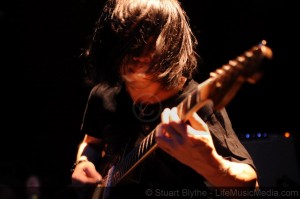Reviewer: Denis Semchenko
 [Photo: Stuart Blythe] |
Concluding my adventures in Hi-Fi (Brisbane) (to paraphrase an R.E.M. album title) for the week – Sia on Thursday, Jarvis Cocker on Saturday – is a Sunday night event with a bill that looks like post-rock lover’s wet dream: Japanese celestial noise giants Mono, sublime Melbournians laura and Brisbane’s own math soundscapists Del Toro. In contrast with the packed earlier shows, there’s room to move and the alcohol-fuelled rowdiness, frequent at “name” gigs, is absent: everyone’s here to listen to MUSIC. |
Soon after the venue opens its doors, the first band comes on. A trio back when I first saw them over a year ago, Del Toro impress a lot more as a four-piece this time. The addition of a keyboard player considerably fills out the previously sparser sonic palette and the pounding primal drums, busy 5-string bass and twangy, echo-saturated guitar sound juicier than ever. There also appears to be a more prominent No Wave/funk slant to the locals’ sound, made even more distinctive by the sporadic jagged passages, set-to-stun delay and swirling flange outros. The last two numbers played – a thick, sludgy dirge and a clattering racket ending with the guitar approximating air the siren – reaffirm the band as purveyors of refreshing, earthy (compared to what we hear later in the night) math-rock.
Following the none-more-suitable intermission music – tracks from Pivot’s lauded O Soundtrack My Heart – Melbourne post-rock powerhouse laura set their magic upon the now-doubled crowd. The Hi-Fi’s world-class soundsystem ensures it’s the sextet’s best Brisbane show to date, even though their arguably finest moment, the arresting Radio Swan Is Down Pt.2, doesn’t get aired. It’s only a mild setback, though, as Pt.1’s weeping cello line and subsequent emotional mayhem are welcome treats and make up for the absent sequel’s spectral beauty. On top of that, all the familiar laura hallmarks – processed feedback swathes, crashing drums, alternately crystal-clear and heavily distorted guitars – are there along with the members’ sheer performing abandon. Bassist Andrew Yardley is a joy to watch as he relentlessly pummels his vintage instrument, head firmly downwards, while his six-string-wielding brother Ben periodically emits shards of noise that actually fit the mix like a glove and hyperactive second axeman Andrew Chalmers’ soaring vocals – always the band’s secret weapon – send live staples Patterns Not People and I Hope skywards. Is There No Hope For The Widow’s Son is an Aussie post-rock epic if there ever was one and Yes Maybe No’s tour-de-force Cardboard Cutout makes for an intense, resounding finish. laura are still mapping our dreams.





I’ve seen the mighty Texans Explosions In The Sky obliterate the senses of all and sundry at The Zoo early last year and seminal Glasgewians Mogwai cause convulsions at The Tivoli in March, but Tokyo’s imperial Mono leave this experienced gig goer with an impression that no words can adequately describe: “sublime” is too soft and “monumental” is too narrow. Even “impossibly beautiful” doesn’t quite seem to summarise the ninety minutes of aural grandeur created for us by guitarists Taka Goto and Yoda, bassist Tamaki Kunishi and drummer Yasunori Takada. This is not just the sound of the East meeting the West – it’s also the sound of planets exploding, new galaxies forming, the sun going supernova and love, peace and serenity lost and found, created by four people with instruments made of wood, skin and metal. As with Sigur Rós, people often cry at Mono’s gigs and are not ashamed of it; theirs is the sound of pure, unadulterated love.
But let’s get back to the show. Emerging from backstage and taking their seats (apart from Kunishi, who mainly stays upright), the four musicians start the Hymn To The Immortal Wind with Ashes In The Snow’s tinkling glockenspiel intro. Recorded with a full orchestra, Mono’s fifth album has already been hailed as their best work and would have been impossible to replicate in a live setting by anyone else but Goto and co, who don’t need strings tonight. The Hi-Fi is befallen by reverential silence as the record’s opening track builds to a climax and merges into the solemn Burial At Sea, the heart-wrenching melody grabbing hold of our collective senses. A classical composer in the body of an instrumental rock band leader and a guitarist of exceptional emotional power, Goto’s whirring octave passages and staccato single-string lines seamlessly meld with Yoda’s complex arpeggios and motor-steady rhythm work while Takada’s levitating drum work summons the images of at least ten men hitting enormous timpani and gongs.
Taking a brief break from her bass, Kunishi sits at the piano for the spine-tingling Follow The Map – the best music piece to have never soundtracked a Wong Kar-Wai’s movie – which erupts like a Bach canon from the speakers. We’re still paralysed as the undulating calm of Pure As Snow (Trails Of The Winter Storm) gradually turns into a sonic hurricane of Katrina-like proportions, Goto and Yoda fiercely swinging on their chairs, hair flailing as they concoct a dense six-string halo. A nod to the band’s past follows in the shape of the longing Yearning, serene Halcyon (Beautiful Days) and the ethereal Kidnapper Bell, taken respectively from 2006’s You Are There, 2004’s Walking Cloud And Deep Red Sky… and 2001 debut Under The Pipal Tree. The surging Battle To Heaven sees the bandmembers get up from their stools before the last of tonight’s revelatory experiences, the saintly Everlasting Light retells the triumph of eternity over death and tragedy, its grandiose concluding swells symbolic of the never ending hope. No encore follows as it’s not needed – Taka Goto’s ensemble have powerfully moved and inspired us.
The sky remains the same as ever and the wind is immortal. Shine on, Mono.
